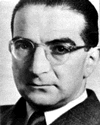Co-editors: Seán Mac Mathúna • John Heathcote
Consulting editor: Themistocles Hoetis
Field Correspondent: Allen Hougland
Rudolf
Kasztner THE
KASTNER TRIAL - shown at the Jewish Film Festival in
1997 Shamash:
The
Jewish Internet Consortium: Holocaust Home
Page The
International Commission on Holocaust Era Insurance
Claims Jim
Allen Is the Holocaust
untouchable, or up for grabs? What, 50 years on, does it
"mean"? After Roberto Benigni shaped genocide into a fable
about resilient human nature, a reprise of Jim Allen's play
Perdition uses events in occupied Hungary as material for
anti-Zionist polemic. It was first due to be staged, in a
production by Ken
Loach, in 1987.
The pre-publicity caused enormous controversy, largely about
the factual content of the play (vehemently disputed by
Jewish historians such as Martin Gilbert and David Cesarani)
and about alleged anti-Semitism. Eventually, the Royal Court
decided it couldn't support it and cancelled the production,
denying that it was bowing to Zionist pressure. Now the Gate
Theatre in Notting Hill is staging what it claims to be a
significantly rewritten version. Perdition caused a rumpus
because it unequivocally argued that Zionism worked with
Nazism before and during the second world war and connected
postwar Israel with European fascism. It suggests that, like
the Nazis, the Zionist movement hoped to clear the Jews out
of Europe, with the difference that they wanted them to end
up in Palestine, rather than the death camps. Taking as its
apparent subject the situation of the Hungarian Jews, it
followed a familiar line in Allen's writing (Days of Hope,
Land and Freedom) about perfidious leaders. "First you
placed a noose round the neck of every Jew in Hungary," its
central figure was told, "then you tightened the knot and
legged it to Palestine." In effect, it argues that certain
Jews themselves acted as Hitler's willing
executioners. The play stages a fictional
libel trial, but refers to and draws on a notorious real
case. In 1953, Rudolf Kastner, an editor living in Israel
and closely associated with the Mapai (Labour) government,
reluctantly brought a libel case following allegations that
he had collaborated when working with the Zionist Rescue
Council in occupied Hungary. The accusations originated from
the Israeli far right, and the sympathetic judge upheld
most, but not all, of the allegations, accusing Kastner of
having "sold his soul to the devil". In 1957, Kastner was
assassinated, but in 1958 he was posthumously cleared by the
Supreme Court of all charges of collaboration. The case was incendiary because
it made Israelis confront some of the founding principles of
their nation. Were those who tried to negotiate with the
Nazis for Jewish lives heroes or quislings? Had the leaders
of European Jewry in a sense assisted the Nazi project? And
more broadly, had the founding Zionists' admitted suspicion
of the Diaspora Jews shaded into a callous indifference that
still underpinned the postwar state? The case continues to
have unresolved resonance in Israel, where a society
addicted to fractious debate continues to worry over
it. Allen sets his play a decade
after Kastner's death, immediately after the six-day war of
1967, which he uses to suggest the continuing nature of
Zionist militarism. It was in the aftermath of this war that
Israeli writers and historians themselves began
reconsidering questions of co-operation with and resistance
to the Nazis. The Kastner case inspired Motti Lerner's
Kastner (1985), which is framed by courtroom scenes but,
unlike Perdition, dramatises the pivotal incidents.
Interestingly, according to Glenda Abramson's excellent
study Drama and Ideology in Modern Israel (Cambridge, 1998),
the play's partial rehabilitation of Kastner placed him not
as Allen does, with Zionist triumphalism, but against the
military hawks. "If not an analogy," she suggests, "the play
is at least a warning to Israel that negotiation may
ultimately serve far better than the exercise of
force." Is Perdition, as an otherwise
temperate leaflet distributed by the Union of Jewish
Students claims, "dancing on the graves of the victims"?
Perhaps not, but neither is it properly respectful. Allen's
chosen form, polemic, leads him to some highly debatable
historical interpretation, but without truly dramatising
events to allow us to judge them. Claude Lanzmann's stern
dictum is that, when it comes to representing the Holocaust,
"fiction is transgression". Certainly fiction is unreliable
in Perdition. Crucially, Allen conflates in his figure of Dr
Yaron a representative of two quite different Hungarian
Jewish organisations: the Jewish Council, or Judenrat, which
was charged with maintaining order in the Jewish community,
and the Zionist Rescue Council, of which Kastner was a
member, and which negotiated with Adolf Eichmann (with
partial success). In reality the two bodies were largely
antagonistic, but the elision allows Allen to attack
virtually all Jewish response to oppression, other than
heroic resistance. During the same year as the
Perdition ructions, Joshua Sobol's Ghetto (written in 1984)
played at the National Theatre. An argumentative masterpiece
set in the Vilna ghetto, it deals with the idea of spiritual
resistance, principally through the metaphor of Yiddish
theatre and music. It, too, examines the role of the
Judenrat and its leader Jacob Gens (derisively name-checked
in the published script of Perdition), but with a range of
troubled, angry nuance that Allen ignores. Elliot Levey's sober production
of Perdition, which I saw at a preview, goes out of its way
to be fair-minded, with inspirational klezmer between scenes
and the prosecuting counsel both feminised and Semitised.
Set in a brightly lit courtroom, the performance suggested
that the witnesses will be played with passion and both
lawyers with unhelpful idiosyncrasy (bellows, tears and some
bizarre Churchillian inflections). The audience seemed
engaged, if sceptical. Allen's language, however, is
audacious, bordering on offensive, bandying charged phrases
with almost reckless indifference to their effect. Cut are
some of the more vicious phrases from early drafts, such as
"the Zionist knife in the Nazi fist" or the barrister's
congratulation, "you crucified him". But the trial still
centres around a pamphlet titled "I Accuse", after Zola's
defence of Dreyfus, and we hear of Jews "carrying out
orders". Burdened by the past, Yaron welcomes the non-Jewish
barrister's "words hard as nails", as if seeking
crucifixion. These are words with a history that needs to be
acknowledged. Like the parting "Shalom" with which the same
barrister exits, there's a queasy sense that these words,
these events, aren't Allen's to treat so
casually. Most tellingly, Allen doesn't
scrutinise his own argument. Counsel for the prosecution is
ineffectual and her questions personal, rather than
political. A character asserts that we mustn't be paralysed
by guilt over the Holocaust, though Perdition confidently
apportions blame. Although we do not see the verdict, none
of the characters doubts that the allegations will be
upheld. I'm not so sure. Try though the Gate might,
Perdition still feels like an appropriation. © New Statesman,
1999


Allen's
chosen form, polemic, leads him to some highly
debatable historical interpretation, but without
truly dramatising events to allow us to judge them.